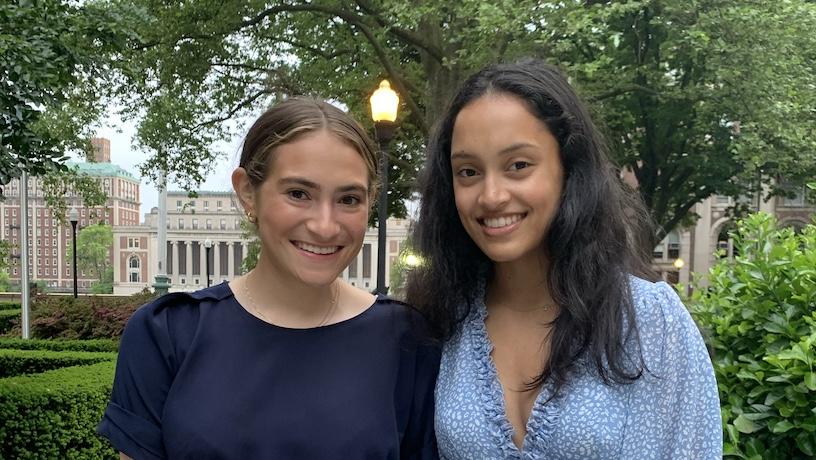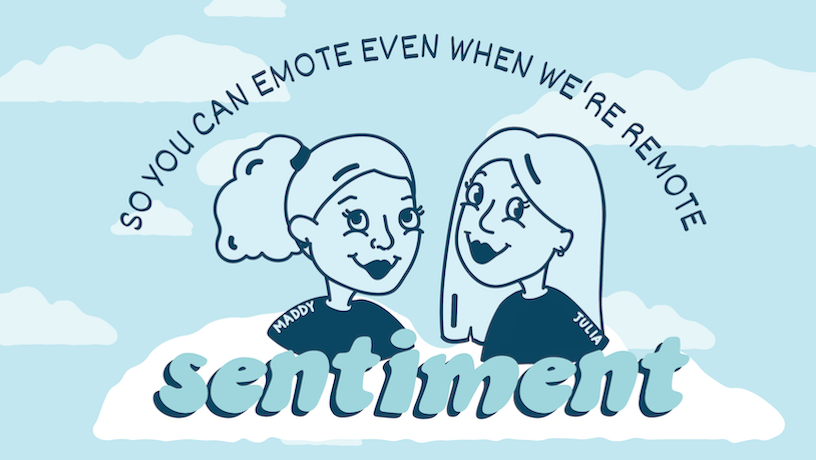Sending the Right Message
Students develop novel texting service to build community during times of disruption

Sentiment founders Madeline Placik (left) and Julia Sheth (right).
As COVID-19 spread across the globe, it soon became apparent that its public health impact would extend far beyond infection rates. In the U.S. alone, a recent poll from the Kaiser Family Foundation found that nearly 50% of respondents reported negative impacts to their emotional wellbeing as a result of the uncertainty and isolation brought on by the pandemic.
That social disruption inspired two physically dislocated Columbia engineers to create Sentiment, a novel self-care texting service devoted to helping people cope.
Suddenly stuck at home, computer scientists and former roommates Madeline Placik ’20 and Julia Sheth ’20 considered how to refocus user interface design research they’d been conducting with Professor Lydia Chilton on facing the pandemic.
“After we had to abruptly leave campus in March, we were feeling out of sorts and both having a bit of a hard time,” Sheth recalls. “Through talking with Professor Chilton, we realized that helping people deal with all the emotions this pandemic brought on could be one way to help, so we put out a survey to get a gauge on how people were dealing with the quarantine. Our main takeaway was how many said just filling out the survey was cathartic for giving them a chance to check in with themselves.”
“The initial idea was a place for reflection through a mobile app, but we knew that would take months to develop,” Placik adds. “Aiming at the most immediate impact, we came up with the idea of a text messaging service that would allow individuals to ‘emote while remote.’”
Currently operating via text and Instagram, Sentiment prompts users to get centered, connect with loved ones, and cultivate community. In April, they competed from afar at the university’s Virtual Campus Design Challenge, ultimately earning a $500 award as the “Most Impactful” project. After consulting online with Professor Harry West, a longtime designer and executive at several companies, and Ivy Schultz, director of Columbia Engineering Entrepreneurship, they won a $5,000 Ignition Grant supporting their startup’s future.

The initial idea was a place for reflection through a mobile app, but we knew that would take months to develop. Aiming at the most immediate impact, we came up with the idea of a text messaging service that would allow individuals to ‘emote while remote’.
“Our Ignition Grants this year were focused on teams with promising ideas in the fight against COVID-19,” Schultz says. “While many of the ideas addressed medical and logistical issues, it was really refreshing to see Sentiment in the mix as an offering of emotional support—as normal human interaction has been disrupted.”
“Throughout this whole process of refining our idea and figuring out next steps, which we’re still in the midst of, we’ve had great mentors,” Sheth says.
In recent weeks, as protests worldwide have called attention to systemic injustices, Sentiment has increasingly incorporated insights crowdsourced from users, ranging from ways to take action to prompts for more meaningful reflection.
“Addressing social justice issues has come up organically through what the Sentiment community are all experiencing,” Placik explains. “We think that by encouraging users to think twice about their thoughts, emotions, and actions—and those of their loved ones—the community can thrive best in momentous times like these.”
“Our community is the most important part of our service, and we want to make sure we’re providing content that’s relevant and helpful,” Sheth says. “The give-and-take we’ve developed with users through interactive messaging is an integral part of our model.”
The duo are currently working on expanding their messaging network, minimizing costs, developing further products, and transforming their initiative into a sustainable business. Even as they map out next steps, the new graduates will soon begin their careers as product analyst and software engineer, both back in New York City.
“We see Sentiment as an approachable tool for people,” Placik says. “Taking time to reflect and step back are absolutely critical now more than ever.”
